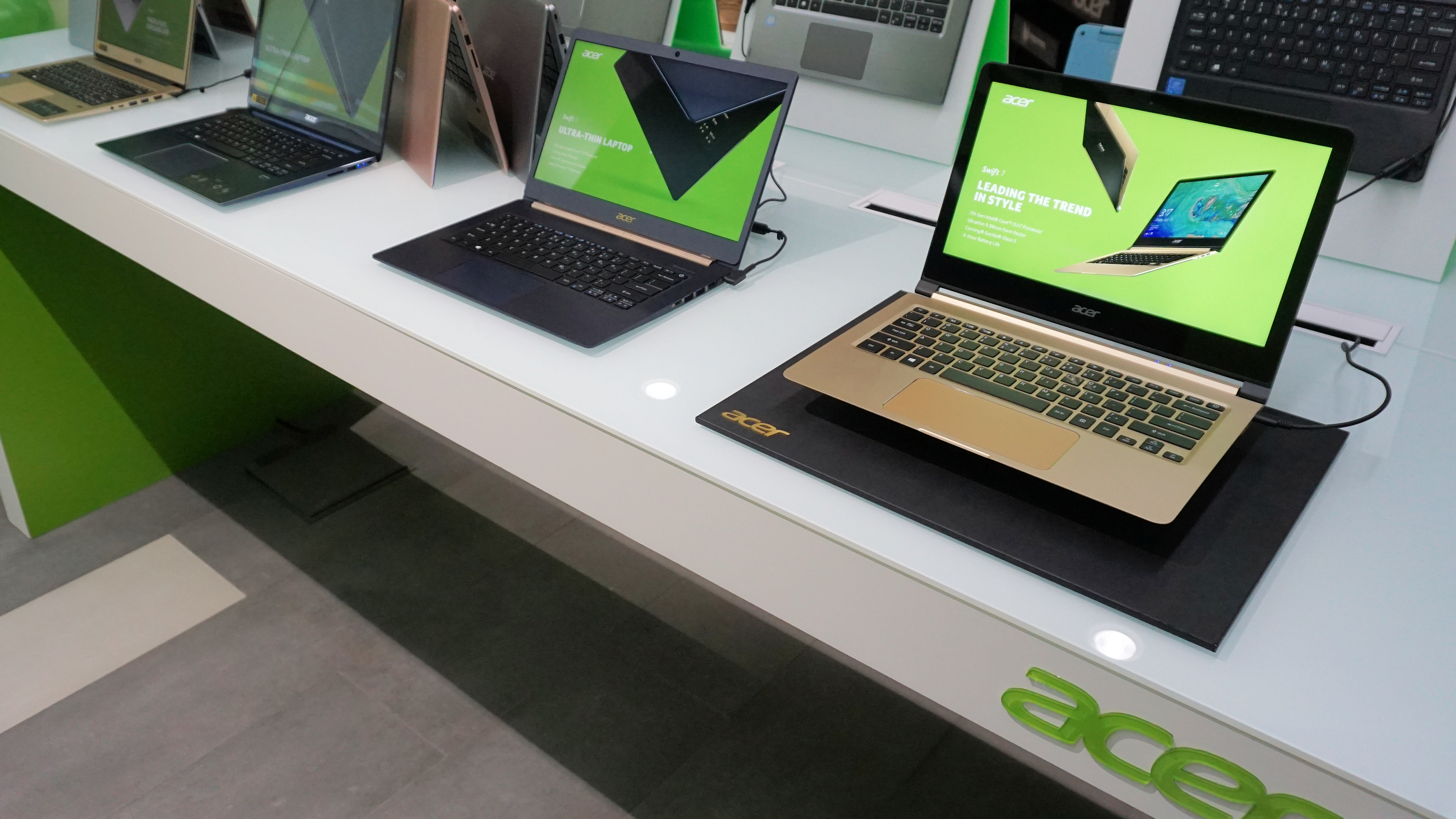
Acer certainly was busy last year, if its earnings report is anything to go by. The company this week reported for the full year of 2017 consolidated revenues of NT$237.28 billion, up 2% year-on-year (YoY). It also registered 380 technology patents last year, ranking among the top 5 companies in Taiwan in terms of new patents.
The company also continues to solidly invest in Chrome products as well, as evident by its latest product, the Chromebook Tab 10.
While Acer has historically enjoyed success in the consumer market, it’s now turning its gaze towards the commercial market as well. The uptake in businesses looking at Chrome and cloud solutions is something that Paul Collins, Acer Middle East General Manager, wants to expand upon in the region.
We spoke with him about Acer’s plans for the commercial market and how the company aims to educate companies on the benefits of cloud services.
The ‘death of the datacenter’ is something that the industry has been buzzing about for some time…
I think it’s something that’s long been coming over the last eight years or so. Your traditional client-server environment has slowly been changing, and we’re reaching that tipping point very soon. I think that very soon companies will be out-costed and outmaneuvered by a far more agile and modern system. The mainframe was the computing system of the 50s, and became more and more marginalized as years went by up until present day. The client-server environment is going to become even more niche as we approach 2020, and it’s something that companies need to be paying attention to.
What’s stopping companies from adopting faster to the cloud?
Sign up to the TechRadar Pro newsletter to get all the top news, opinion, features and guidance your business needs to succeed!
I think there were some fears with the cloud originally about where data was being store, how secure it was, etc. As more and more companies started adopting cloud to their businesses, they’re starting to see the actual benefits of a cloud model, which is being able to have access to the best of everything – servers, people, software, security, you name it. You get 99.99% uptime on your services, which you can’t always provide yourself unless you’re paying a fortune. I think those benefits are starting to outweigh the very traditional fears that companies had. Different countries will adopt cloud at a different rate, so it’s very interesting to see how things will play out.
The important question to ask is how will traditional companies compete against those that are more agile and cost-effective because of their adoption of cloud services. You’ll be forced to change your model as well, and that goes back to my original scenario of this all being a tipping point. The more adoption occurs in the market, the faster it’s going to be picked up by everyone else.
5G appears to be another huge buzz for the enterprise market - is this something that companies should keep an eye on?
Wi-Fi is fairly accessible here, so at the moment it’s still early days. I think for enterprise clients that have businesses that are more spread out in remote areas, 5G is going to really help out. It’s also going to require new players to come into the market to provide these kind of services, so it’s all a matter of competitiveness. You can’t afford to just stay behind – these technologies and changes will have to be adopted, so there’s just no escaping it. You’re just going to have one device to access your data, but everything else will just be managed for you instead – the adoption model is completely different now.
Managed services is where Acer has an advantage over competitors in the market. They’re all vested in older technologies, so they may not be as committed to cloud and the cloud channel as we are. Cloud partners are fighting against older traditional partners to dislodge not just the technology, but also the physical hardware and resellers that provide them. There are a lot of clients that we can currently approach and talk to about adopting new technologies, because they’re poised to move away from traditional services and move to more flexible ones.
What inspired you to start making a move into the enterprise market?
Internationally we’ve been looking at how we approach the commercial segment – I think we do a poor job of telling people what we do, but that’s something we’re certainly going to be changing. In Taiwan and South Africa for example, we have very good market shares in the commercial, government, and SMB sectors. In the education sector as well we’ve got a strong hold, so it’s something we just want to focus on for other markets as well. It really is down to us to start balancing out business properly – our consumer segment is doing really well now, so it’s time to focus on other parts of the business. We owe it to the market – we have some fantastic products that need to be in the market, so you’ll be seeing a lot of things coming from us very soon.
Will Chromebooks be a pushing point for Acer?
Not so much in MENA region, but on a global scale this could be a pivotal moment for us. It’s something that we already have a strong base with, and it really could take us in a new direction, so we’ve already started looking at some interesting opportunities. Things are really starting to change within the industry, and this could be a real game-changer for us. The uptake on cloud in the UAE is phenomenal – up to 72% of new startups in Dubai are going straight to the cloud rather than to traditional system setups, which makes them more agile and scalable than ever before.
Have there been any specific challenges when talking to people in the local market?
At first it seemed like an impossible task, because people were buying what they already knew, so it would be challenging to try and persuade them otherwise. But the fact remains is that cloud is going to be thrust on companies whether they like it or not. Their competitors are already ahead in the game, so they have to follow through in order to stay competitive. Is it going to be easy? Not at all, but there’s going to be a serious uptake to look forward to.
Will you be targeting companies that primarily haven’t yet adopted cloud systems into their infrastructure?
Most of the uptake will be new businesses, so those are ideal target market. We’ll be working with core channel providers to speak to both sides of the market, to see just how we can work together in their businesses. There’s a lot of convenience and savings to be involved, so it’s something we need to explain clearly to companies so that they fully understand what we can offer.
Are you going to be leveraging Acer’s success in the consumer market to get some headway with companies?
Our success in the consumer market is definitely something that’s going to cross over into the commercial sector as well. We’re starting to see a huge uptake in what we call our ‘prosumer’ lineups, such as our thin and light offerings which are now being taken into the business environment by people who want fast, lightweight machines. I think that’s a key strength for us, that we have such a diverse portfolio of products. So we really do have a product for everybody – the days of driving a ‘corporate-only’ product are long gone.
Do you have any timelines for the region with getting things off the ground?
We’re gearing up for a launch very soon, but we’re talking to the right partners and getting the right staff lined up, so we should have everything ready to launch in the next 3-4 weeks. By the end of 2018 I want to be on track with going to 15% market share in that segment. We might not quite get there because we’ve only got seven months left, but we’re pushing ahead nonetheless. The buzz around Chrome is fantastic and there’s a lot of things coming out around it, so we want to keep focusing on that as well. Our biggest challenge will be getting to products physically to the market – we haven’t pushed these products to the market before, so we’ve got to get a clear strategy for product positioning with our distributors to make sure that they understand why these product need to be here as quickly as possible.
A former IT & Marketing Manager turned full time Editor, Nick enjoys reviewing PC components, 3D Printers, projectors, and anything shiny and expensive. He can also be found baking up a storm in the kitchen, which we are more than happy to encourage.
